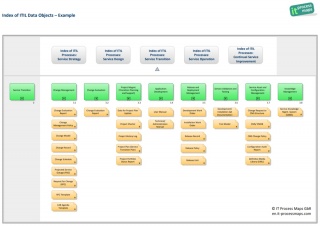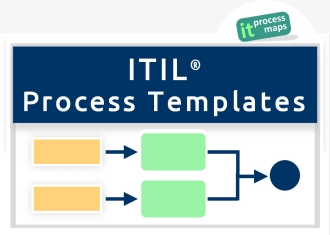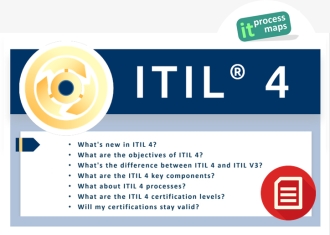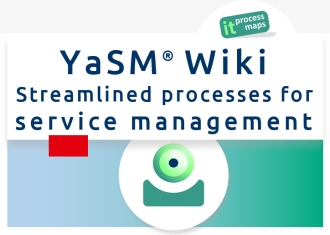ITIL Glossary/ ITIL Terms B: Difference between revisions
Created page with "<seo metakeywords="ITIL glossary definitions acronyms meanings terms words itsm it-service-management B" metadescription="Use this ITIL Glossary to look up the definitions of ..." |
No edit summary |
||
| (One intermediate revision by the same user not shown) | |||
| Line 1: | Line 1: | ||
< | <itpmch><title>ITIL Glossary/ ITIL Terms B | IT Process Wiki</title> | ||
<meta name="keywords" content="ITIL glossary definitions acronyms meanings terms words itsm it-service-management B" /> | |||
<meta name="description" content="Use this ITIL Glossary to look up the definitions of ITIL terms starting with the letter B: Baseline, Budget Allocation, ..., Business Relationship Manager." /> | |||
</itpmch> | |||
__NOTOC__ | __NOTOC__ | ||
<imagemap> | <imagemap> | ||
Image:Thumb-glossary-itil.jpg|right|[[ITIL Glossary|'''ITIL Glossary:''']]<br />All terms related to ITIL (ITIL 2011, ITIL V3 & V2) and IT Service Management | Image:Thumb-glossary-itil.jpg|right|[[ITIL Glossary|'''ITIL Glossary:''']]<br />All terms related to ITIL (ITIL 4, ITIL 2011, ITIL V3 & V2) and ITSM (IT Service Management)|320px|alt=ITIL Glossary|thumb | ||
default [[ITIL Glossary]] | default [[ITIL Glossary]] | ||
desc bottom-left | desc bottom-left | ||
| Line 13: | Line 16: | ||
|} | |} | ||
This ITIL glossary includes definitions for key terms and acronyms of ITIL and ITSM (IT service management) in alphabetical order.[[ITIL Glossary/_ITIL_Terms_1-9#ITIL|['''1''']]] | |||
[[ITIL Glossary#All ITIL Terms| | [[ITIL Glossary#All ITIL Terms|View the full list]] or use the alphabetical index: | ||
{| | {| | ||
| Line 27: | Line 30: | ||
<p> </p> | <p> </p> | ||
<p><span id="top"> </span></p> | <p><span id="top-b"> </span></p> | ||
==ITIL Terms | ===ITIL Terms beginning with <big>B</big>=== | ||
---- | |||
Please click on one of the terms to see its definition. | Please click on one of the terms to see its definition. | ||
| Line 37: | Line 39: | ||
<p> </p> | <p> </p> | ||
* [[#Baseline|Baseline]] | *[[#Baseline|Baseline]] | ||
* [[#Budget Allocation|Budget Allocation]] | *[[#Budget Allocation|Budget Allocation]] | ||
* [[#Budget Request|Budget Request]] | *[[#Budget Request|Budget Request]] | ||
* [[#Business Capacity Management|Business Capacity Management]] | *[[#Business Capacity Management|Business Capacity Management]] | ||
* [[#Business Continuity Strategy|Business Continuity Strategy]] | *[[#Business Continuity Strategy|Business Continuity Strategy]] | ||
* [[#Business Impact and Risk Analysis|Business Impact and Risk Analysis]] | *[[#Business Impact and Risk Analysis|Business Impact and Risk Analysis]] | ||
* [[#Business Planning Information|Business Planning Information]] | *[[#Business Planning Information|Business Planning Information]] | ||
* [[#Business Relationship Management|Business Relationship Management]] | *[[#Business Relationship Management|Business Relationship Management]] | ||
* [[#Business Relationship Manager|Business Relationship Manager]] | *[[#Business Relationship Manager|Business Relationship Manager]] | ||
<p> </p> | <p> </p> | ||
| Line 52: | Line 54: | ||
====Baseline==== | ====Baseline==== | ||
* An ITSM can be used as a starting point to measure the effectiveness of a [[ITIL_Glossary/_ITIL_Terms_S#Service Improvement Plan (SIP)|Service Improvement Plan]] | *An ITSM can be used as a starting point to measure the effectiveness of a [[ITIL_Glossary/_ITIL_Terms_S#Service Improvement Plan (SIP)|Service Improvement Plan]] | ||
* A Performance Baseline can be used to measure changes in Performance over the lifetime of an IT Service | *A Performance Baseline can be used to measure changes in Performance over the lifetime of an IT Service | ||
* A Configuration Management Baseline can be used to enable the IT Infrastructure to be restored to a known Configuration if a Change or [[ITIL_Glossary/_ITIL_Terms_R#Release|Release]] fails. | *A Configuration Management Baseline can be used to enable the IT Infrastructure to be restored to a known Configuration if a Change or [[ITIL_Glossary/_ITIL_Terms_R#Release|Release]] fails. | ||
====Budget Allocation==== | ====Budget Allocation==== | ||
* A budget allocated by the [[ITIL Roles#Financial Manager|Financial Manager]] to implement a Change. Budget Allocations are issued in response to [[#Budget Request|Budget Requests]] originating from any Service Management process in conjunction with [[ITIL_Glossary/_ITIL_Terms_R#Request for Change (RFC)|Requests for Change]]. | *A budget allocated by the [[ITIL Roles#Financial Manager|Financial Manager]] to implement a Change. Budget Allocations are issued in response to [[#Budget Request|Budget Requests]] originating from any Service Management process in conjunction with [[ITIL_Glossary/_ITIL_Terms_R#Request for Change (RFC)|Requests for Change]]. | ||
* → ITIL processes, [[ITIL | *→ ITIL processes, [[ITIL Service Strategy|ITIL Service Strategy]] > [[Financial Management]] | ||
====Budget Request==== | ====Budget Request==== | ||
* A request for a budget, typically issued from any of the [[ITIL Processes|Service Management processes]] at the same time when compiling a [[ITIL_Glossary/_ITIL_Terms_R#Request for Change (RFC)|Request for Change]]. | *A request for a budget, typically issued from any of the [[ITIL Processes|Service Management processes]] at the same time when compiling a [[ITIL_Glossary/_ITIL_Terms_R#Request for Change (RFC)|Request for Change]]. | ||
* An approved Budget Request means that the required financial resources for implementing a Change are approved by [[Financial Management]]. | *An approved Budget Request means that the required financial resources for implementing a Change are approved by [[Financial Management]]. | ||
* → ITIL processes, [[ITIL | *→ ITIL processes, [[ITIL Service Strategy|ITIL Service Strategy]] > [[Financial Management]] | ||
====Business Capacity Management==== | ====Business Capacity Management==== | ||
* → ITIL sub- | *→ ITIL sub-process, [[Capacity Management#Business Capacity Management ITIL|Business Capacity Management]] | ||
====Business Continuity Strategy==== | ====Business Continuity Strategy==== | ||
* An outline of the approach to ensure the continuity of Vital Business Functions in the case of disaster events. | *An outline of the approach to ensure the continuity of Vital Business Functions in the case of disaster events. | ||
* The Business Continuity Strategy is prepared by the business and serves as a starting point for producing the [[ITIL_Glossary/_ITIL_Terms_I#IT Service Continuity Strategy|IT Service Continuity Strategy]]. | *The Business Continuity Strategy is prepared by the business and serves as a starting point for producing the [[ITIL_Glossary/_ITIL_Terms_I#IT Service Continuity Strategy|IT Service Continuity Strategy]]. | ||
* → ITIL processes, [[ITIL | *→ ITIL processes, [[ITIL Service Design|ITIL Service Design]] > [[IT Service Continuity Management]] | ||
====Business Impact and Risk Analysis==== | ====Business Impact and Risk Analysis==== | ||
* Business Impact Analysis (BIA) and Risk Analysis are concepts associated with Risk Management. | *Business Impact Analysis (BIA) and Risk Analysis are concepts associated with Risk Management. | ||
* Their ultimate goal is to identify which risks must be managed and addressed by risk mitigation measures. | *Their ultimate goal is to identify which risks must be managed and addressed by risk mitigation measures. | ||
* → ITIL processes, [[ITIL | *→ ITIL processes, [[ITIL Service Design|ITIL Service Design]] > [[Risk Management]] | ||
====Business Planning Information==== | ====Business Planning Information==== | ||
* Business Planning Information includes important input from clients and external service providers, especially for devising the Service Strategy and looking for ways to improve services. | *Business Planning Information includes important input from clients and external service providers, especially for devising the Service Strategy and looking for ways to improve services. | ||
* This input will highlight, for example, planned business initiatives like the introduction of new product/ service offerings or the expansion into new markets, as well as information on the future development of business activity, especially expected increases in business transaction volumes. | *This input will highlight, for example, planned business initiatives like the introduction of new product/ service offerings or the expansion into new markets, as well as information on the future development of business activity, especially expected increases in business transaction volumes. | ||
* This information helps the service organization understand the businesses it serves and their plans for the future, allowing it to offer and develop the right set of services. | *This information helps the service organization understand the businesses it serves and their plans for the future, allowing it to offer and develop the right set of services. | ||
* → ITIL processes, [[ITIL | *→ ITIL processes, [[ITIL Service Strategy|ITIL Service Strategy]] > [[ITIL Strategy Management|Strategy Management for IT Services]] | ||
====Business Relationship Management==== | ====Business Relationship Management==== | ||
* → ITIL processes, [[ITIL | *→ ITIL processes, [[ITIL Service Strategy|ITIL Service Strategy]] > [[Business Relationship Management]] | ||
====Business Relationship Manager==== | ====Business Relationship Manager==== | ||
* → Roles within ITIL, [[ITIL Roles#Business Relationship Manager|Business Relationship Manager]] | *→ Roles within ITIL, [[ITIL Roles#Business Relationship Manager|Business Relationship Manager]] | ||
* The Business Relationship Manager is responsible for maintaining a positive relationship with customers, identifying customer needs and ensuring that the service provider is able to meet these needs with an appropriate catalogue of services. | *The Business Relationship Manager is responsible for maintaining a positive relationship with customers, identifying customer needs and ensuring that the service provider is able to meet these needs with an appropriate catalogue of services. | ||
* The Business Relationship Manager works closely with the Service Level Manager. | *The Business Relationship Manager works closely with the Service Level Manager. | ||
* The Business Relationship Manager has been introduced as a new role in ITIL 2011. | *The Business Relationship Manager has been introduced as a new role in ITIL 2011. | ||
<p> </p> | <p> </p> | ||
<div align="right">[[#top|→ ITIL terms starting with "B"]]</div> | <div align="right">[[#top-b|→ ITIL terms starting with "B"]]</div> | ||
<div align="right">[[ITIL Glossary#All ITIL Terms|→ Look up all ITIL terms]]</div> | <div align="right">[[ITIL Glossary#All ITIL Terms|→ Look up all ITIL terms]]</div> | ||
| Line 103: | Line 105: | ||
'''<span id="ITIL">Notes</span>''' | '''<span id="ITIL">Notes</span>''' | ||
[1] ITIL® and IT Infrastructure Library® are Registered Trade Marks of the PeopleCert group. | |||
[2] Source (partially): ITIL glossary and abbreviations © AXELOS Limited. All glosseries and terms for the AXELOS Global Best Practice Portfolio, including glosseries for ITIL v3 and ITIL 4 in various languages, are available for download on the [https://www.axelos.com/glossaries-of-terms AXELOS web site]. | |||
<html> | <html>By:  Stefan Kempter <a href="https://www.linkedin.com/in/stefankempter"><img style="margin:0px 0px 0px 0px;" src="/images/bookmarking/linkedin.png" width="16" height="16" title="By: Stefan Kempter | Profile on LinkedIn" alt="Author: Stefan Kempter, IT Process Maps GbR" /></a>  and  Andrea Kempter <a href="https://www.linkedin.com/in/andreakempter"><img style="margin:0px 0px 0px 0px;" src="/images/bookmarking/linkedin.png" width="16" height="16" title="By: Andrea Kempter | Profile on LinkedIn" alt="Contributor: Andrea Kempter, IT Process Maps GbR" /></a>, IT Process Maps.</html> | ||
<a | |||
<small> | <small> | ||
<html> | <html> | ||
<p> | <p> | ||
<span itemscope="itemscope | <span itemprop="breadcrumb" itemscope itemtype="http://schema.org/BreadcrumbList"> | ||
<a href="https://wiki.en.it-processmaps.com/index.php/Main_Page | <span itemprop="itemListElement" itemscope itemtype="http://schema.org/ListItem"> | ||
</span> | <a itemprop="item" href="https://wiki.en.it-processmaps.com/index.php/Main_Page"> <span itemprop="name">ITIL Wiki</span></a><meta itemprop="position" content="1" /></span> › | ||
<span | <span itemprop="itemListElement" itemscope itemtype="http://schema.org/ListItem"> | ||
<a href="https://wiki.en.it-processmaps.com/index.php/ITIL_Glossary | <a itemprop="item" href="https://wiki.en.it-processmaps.com/index.php/ITIL_Glossary"> <span itemprop="name">ITIL Glossary</span></a><meta itemprop="position" content="2" /></span> › | ||
</span> | <span itemprop="itemListElement" itemscope itemtype="http://schema.org/ListItem"> | ||
<span | <a itemprop="item" href="https://wiki.en.it-processmaps.com/index.php/ITIL_Glossary/_ITIL_Terms_B"> <span itemprop="name">ITIL Glossary: Terms starting with B</span></a> | ||
<a href="https://wiki.en.it-processmaps.com/index.php/ITIL_Glossary/_ITIL_Terms_B | <meta itemprop="position" content="3" /></span> | ||
</span> | </span></p> | ||
</p> | |||
</html> | </html> | ||
</small> | </small> | ||
Latest revision as of 16:57, 7 February 2019

All terms related to ITIL (ITIL 4, ITIL 2011, ITIL V3 & V2) and ITSM (IT Service Management)
| ITIL Glossary Terms |
This ITIL glossary includes definitions for key terms and acronyms of ITIL and ITSM (IT service management) in alphabetical order.[1]
View the full list or use the alphabetical index:
| 1 ... 9 |
| A | B | C | D | E | F | G | H | I | J | K | L | M | ||||||||||||
| N | O | P | Q | R | S | T | U | V | W | X | Y | Z |
ITIL Terms beginning with B
Please click on one of the terms to see its definition.
- Baseline
- Budget Allocation
- Budget Request
- Business Capacity Management
- Business Continuity Strategy
- Business Impact and Risk Analysis
- Business Planning Information
- Business Relationship Management
- Business Relationship Manager
Definitions
Baseline
- An ITSM can be used as a starting point to measure the effectiveness of a Service Improvement Plan
- A Performance Baseline can be used to measure changes in Performance over the lifetime of an IT Service
- A Configuration Management Baseline can be used to enable the IT Infrastructure to be restored to a known Configuration if a Change or Release fails.
Budget Allocation
- A budget allocated by the Financial Manager to implement a Change. Budget Allocations are issued in response to Budget Requests originating from any Service Management process in conjunction with Requests for Change.
- → ITIL processes, ITIL Service Strategy > Financial Management
Budget Request
- A request for a budget, typically issued from any of the Service Management processes at the same time when compiling a Request for Change.
- An approved Budget Request means that the required financial resources for implementing a Change are approved by Financial Management.
- → ITIL processes, ITIL Service Strategy > Financial Management
Business Capacity Management
- → ITIL sub-process, Business Capacity Management
Business Continuity Strategy
- An outline of the approach to ensure the continuity of Vital Business Functions in the case of disaster events.
- The Business Continuity Strategy is prepared by the business and serves as a starting point for producing the IT Service Continuity Strategy.
- → ITIL processes, ITIL Service Design > IT Service Continuity Management
Business Impact and Risk Analysis
- Business Impact Analysis (BIA) and Risk Analysis are concepts associated with Risk Management.
- Their ultimate goal is to identify which risks must be managed and addressed by risk mitigation measures.
- → ITIL processes, ITIL Service Design > Risk Management
Business Planning Information
- Business Planning Information includes important input from clients and external service providers, especially for devising the Service Strategy and looking for ways to improve services.
- This input will highlight, for example, planned business initiatives like the introduction of new product/ service offerings or the expansion into new markets, as well as information on the future development of business activity, especially expected increases in business transaction volumes.
- This information helps the service organization understand the businesses it serves and their plans for the future, allowing it to offer and develop the right set of services.
- → ITIL processes, ITIL Service Strategy > Strategy Management for IT Services
Business Relationship Management
- → ITIL processes, ITIL Service Strategy > Business Relationship Management
Business Relationship Manager
- → Roles within ITIL, Business Relationship Manager
- The Business Relationship Manager is responsible for maintaining a positive relationship with customers, identifying customer needs and ensuring that the service provider is able to meet these needs with an appropriate catalogue of services.
- The Business Relationship Manager works closely with the Service Level Manager.
- The Business Relationship Manager has been introduced as a new role in ITIL 2011.
Notes
[1] ITIL® and IT Infrastructure Library® are Registered Trade Marks of the PeopleCert group.
[2] Source (partially): ITIL glossary and abbreviations © AXELOS Limited. All glosseries and terms for the AXELOS Global Best Practice Portfolio, including glosseries for ITIL v3 and ITIL 4 in various languages, are available for download on the AXELOS web site.
By: Stefan Kempter ![]() and Andrea Kempter
and Andrea Kempter ![]() , IT Process Maps.
, IT Process Maps.
ITIL Wiki › ITIL Glossary › ITIL Glossary: Terms starting with B






